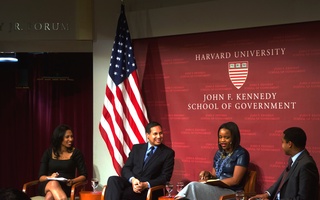At the Conference on Race and Justice in the Age of Obama, academics, activists, and government officials engaged in a heated debate about whether President Barack Obama effectively addressed race-related issues during his administration.
The conference, sponsored by the the Ash Center for Democratic Governance and Innovation at the Kennedy School, spanned two days and featured four panels.
During the opening panel on the second day, “Obama’s Legacy: Opportunity and Opportunities Missed,” panelists discussed the opportunity Obama had to draft impactful legislation, and addressed criticisms of his presidency.
Mary F. Berry, a professor at the University of Pennsylvania who specializes in Africana studies, said Obama’s healthcare policy has left millions of poor Americans without health insurance.
“There is an egregious failure in the Affordable Care Act that left a hole wide enough for a truck to drive through, so that the Court can find that Medicaid did not have to be expanded,” she said.
The panelists also discussed the need for education and criminal justice reform, which Shermichael V. Singleton, a Republican political analyst, considered a shortcoming of Obama’s presidency.
“For the people who gave you a majority of their votes both times, and haven’t received anything in return, you mean to tell me that you can’t focus on making it easier for them to have access to a quality education?” he said, referring to the black voters who supported Obama.
During a panel examining “The State of Civil Rights Under Obama,” Megan M. Francis, an assistant professor at the University of Washington, said that certain human rights issues abroad, such as drone strikes and torture, have intensified in the last eight years.
Ronald S. Sullivan Jr., a professor at Harvard Law School, argued that despite Obama’s limited executive powers, his administration’s Justice Department is working resolutely to advance civil liberties.
“A president can’t wave a magic wand and say, ‘Civil rights, repair!’ That doesn’t happen. The executive is constrained in very real ways,” he said.
Audience members said they appreciated the range of opinions voiced during the panels, which included both Republican and Democratic speakers.
“The exchange was particularly thoughtful and actually surpassed my expectations in terms of the breadth of opinion,” said Michael Schoenleber, a political consultant from the Boston area who attended the event.
It is significant that the conference took place before Obama left office, said Kahlil G. Muhammad, co-chair of the conference and a professor at the Kennedy School.
“This is a conversation that should be happening before November 8, so people know what to do on November 9 and every day after that,” he said.
Read more in University News
Striking Dining Services Union Launches Online FundraiserRecommended Articles
-
Obama Stars at ConventionBOSTON—“What is Obama Barack?” a well-shaven man in a pinstriped suit asked me in the hall of the FleetCenter early
-
Looking Backward and Forward from Election Day, 2008Most American voters appear to support Barack Obama for the presidency. The fact that the presumed winner is a young
-
Obama for MankindHe’s not the messiah. He’s a breath of fresh air and possibility. His victory arouses widespread relief and positive energy
-
An Oath “Faithfully” ReenactedTwo weeks ago, it was the Flub Heard ’Round The World. Today, President Barack Obama’s forgettable and fumbled exchange with
-
 Panel Dissects Obama’s Race and Justice Legacy
Panel Dissects Obama’s Race and Justice Legacy













